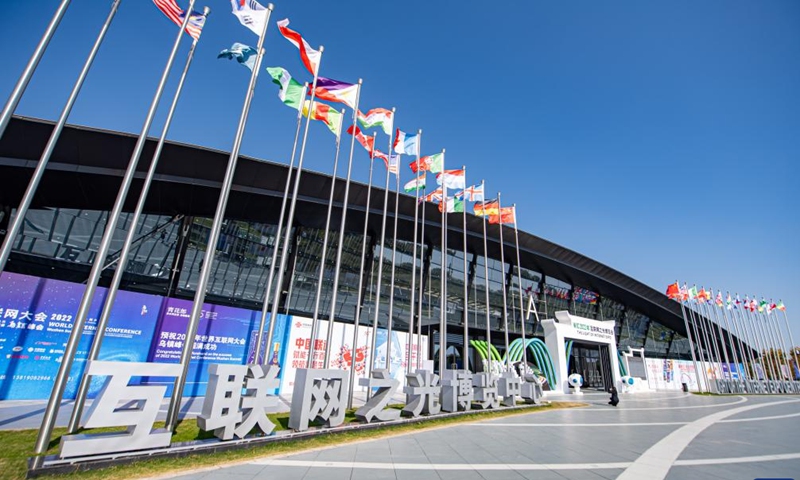Wuzhen summit kicks off with glaring tech display and focus on building a community with a shared future in cyberspace

This photo taken on Nov. 8, 2022 shows the venue of the Light of Internet Expo in Wuzhen, east China's Zhejiang Province. The expo kicked off on Tuesday. Photo: Xinhua
China kicked off the 2022 World Internet Conference (WIC) Wuzhen Summit in the water town of Wuzhen, East China's Zhejiang Province, on Wednesday, as delegates from China's most renowned internet companies and executives from overseas cyber firms gathered again to discuss key topics related to the online industry such as cyberspace governance and industrial digitalization.
With the on-site display of tech-backed interactive games and eye-catching technologies, multiple sub forums and a focus on building a community with a shared future in cyberspace, this year's Wuzhen Summit has a lot of familiarities with last year's. But many new highlights are also turning up, such as rising number of applicants and a first-ever cloud exhibition hall for presentation of exhibits all year around, reflecting the growing influence of the summit or, more generally, China's internet industry in the world.
Chinese President Xi Jinping on Wednesday sent a congratulatory letter to the summit.
In the letter, Xi noted that China is willing to work with countries around the world to blaze a global digital development path that features joint building and sharing of digital resources, vibrant digital economy, efficient digital governance, flourishing digital culture, effectively guaranteed digital security, and mutually beneficial digital cooperation.
Accelerated efforts should be made to build a community with a shared future in cyberspace, contributing wisdom and strength to world peace and development as well as to the progress of human civilization, Xi said.
The summit is the first annual meeting of the World Internet Conference, a Beijing-headquartered international organization inaugurated in July.
Summit on site
Attendants were filled with emotion and happiness when they talked about feelings of participating in the Wuzhen Summit, particularly under the impact of the lingering COVID-19 pandemic and as the world is facing many unstable factors and new challenges this year such as economic slowdown, geo-political tensions and tech wrestling between major countries.
"Wuzhen has witnessed the development of China's internet industry which changes from day to day," Wu Yunkun, president of Chinese cyberspace security service provider Qianxin Group who attended the WIC for the fourth time, told the Global Times, noting he is paying particular attention to the topics about internet security, scientific innovation and talent nurturing.
Wan Lin, CEO of Cainiao Network, also attended this year's WIC. Wan told the Global Times that Chinese companies have always been progressing in the direction of building a community with a shared future in cyberspace, including by enhancing hardware foundation and software facilities.
But with the changes in macro environment and global situation, many companies are thinking how to adjust their own strategies to adapt to industrial changes, Wan noted, adding that he very much wants to see and hear new ideas and thinking on this topic.
Guan Zhou, a senior executive from Global System for Mobile Communications Association (GSMA), said that this is the first time he came to the Wuzhen Summit since the coronavirus outbreak, and he felt both strange and familiar, the Zhejiang Daily reported, adding that Guan pays a particular attention to 5G development topics.
This year, more than 2,000 representatives from over 120 countries and regions gathered at the 2022 WIC under the theme of "Towards a Shared Digital Future in a Connected World -- Building a Community with a Shared Future in Cyberspace,'' including delegates from Chinese tech giants like BAT (Baidu, Alibaba and Tencent), executives from Russian cybersecurity firm Kaspersky, as well as many internet talent and experts.
The Light of Internet Expo, a side event of the 2022 WIC which opened on Tuesday, still catches a lot of limelight this year. Many visitors actively participated in the tech displays at this year's expo, such as an interactive metaverse digital human dance game brought by China Mobile. The robot exhibits, such as one wearable exoskeleton robot presented by the China Electronic Technology Group Corporation (CETC), also draw public attention.
Zhang Yong, the CEO of Alibaba Group, said during a speech on Wednesday during the Wuzhen Summit that Alibaba will always take root in the real economy, actively participate in the construction of a community of shared future in cyberspace, make good use of digital technology to help medium- and small-sized enterprises, and accelerate the arrival of industrial changes, according to media reports.
Chinese responsibilities
Experts noted that China's focus on building a community with a shared future in cyberspace shows the nation's responsibility as an economic powerhouse to stress on cooperation instead of decoupling.
Zhang Xiaorong, director of the Beijing-based Cutting-Edge Technology Research Institute, said that countries around the world have very different interests and values in cyberspace. For China, it aims to offer new ideas for seeking a governance model based on global consensus.
"The internet is a common space for human activities, and a community with a shared future in cyberspace means coexistence in cyberspace," he told the Global Times.
But Zhang stressed that while pursuing own interests and values, any country should also respect and accommodate the legitimate interests and value choices of other countries, and promote the common development of all countries in the process of pursuing its own development.
Liu Dingding, a veteran independent tech analyst, also told the Global Times that China has made great achievements on anti-monopoly and other internet issues, and the country can share those successful experiences with the world for reference, under the circumstances that relevant laws and regulations keep pace with the opening-up procedures.
In particular, experts picked up the US as a bad example of trampling on other countries' values in the process of strengthening cyberspace governance. In April, the US and an array of other nations signed a commitment called "Declaration for the Future of the Internet" to push rules for the internet sector.
Shen Yi, Director of Center for Cyberspace Governance Studies at Fudan University who also attended this year's Wuzhen Summit, said that China's people-oriented development concept is completely different from US', where the development of the internet essentially serves the financial market to achieve American hegemony and benefit only a small group of people or companies.
"The essence of this Declaration for the Future of the Internet is to use ideology to divide the global internet industry into two camps - the 'democratic' camp and 'non-democratic' camp. The US asks countries to rule out the non-democratic camp that includes China and Russia. But it doesn't work," Shen told the Global Times.
Foreign Ministry spokesperson Zhao Lijian also said at a press conference in May that the US has launched mass surveillance and cyber theft with world-leading cyber technologies while accusing China on cybersecurity issues.
A Chinese cybersecurity company released a series of reports revealing that the US government conducts malicious cyber activities against many countries around the world, including China, Zhao disclosed.
Internet development
Although China's online economy has reached a sort of crossing point under toughening regulatory management as well as an increasingly complicated global environment, the country's internet sector still reported rapid growth last year, with many emerging internet technologies like cloud computing and big data jumping into world front ranks, while the industrial scale of cyberspace security service market surging by 15.8 percent on a yearly basis last year, according to a report released by the Internet Society of China in September.
A bluebook for the World Internet Conference was released on Wednesday during the Wuzhen Summit. According to the report, China ranks the second in the world in terms of internet development after the US.
China's State Council Information Office also released a white paper on Monday. According to the paper, the value of China's digital economy had reached 45.5 trillion yuan by 2021, accounting for 39.8 percent of its GDP.
Experts noted that China's internet development was a great contribution to world economy at a time when many countries are facing economic slowdown risks.
"Whether in terms of software, hardware, commodities or services, Chinese companies are exporting resources to the global cyberspace development," Liu said, adding that the rise of TikTok is also an example of China's success.
Zhang said that there should be two directions for China's internet development: make breakthroughs in basic level innovation and key links of the industry, and become established in overseas markets.
Shen also said that the industrial development in China, such as the information technology and digital economy, has hit a "plateau," which means steady but relatively slow growth, and a new round of explosive growth will be based on new accumulation, expansion and improvement.


